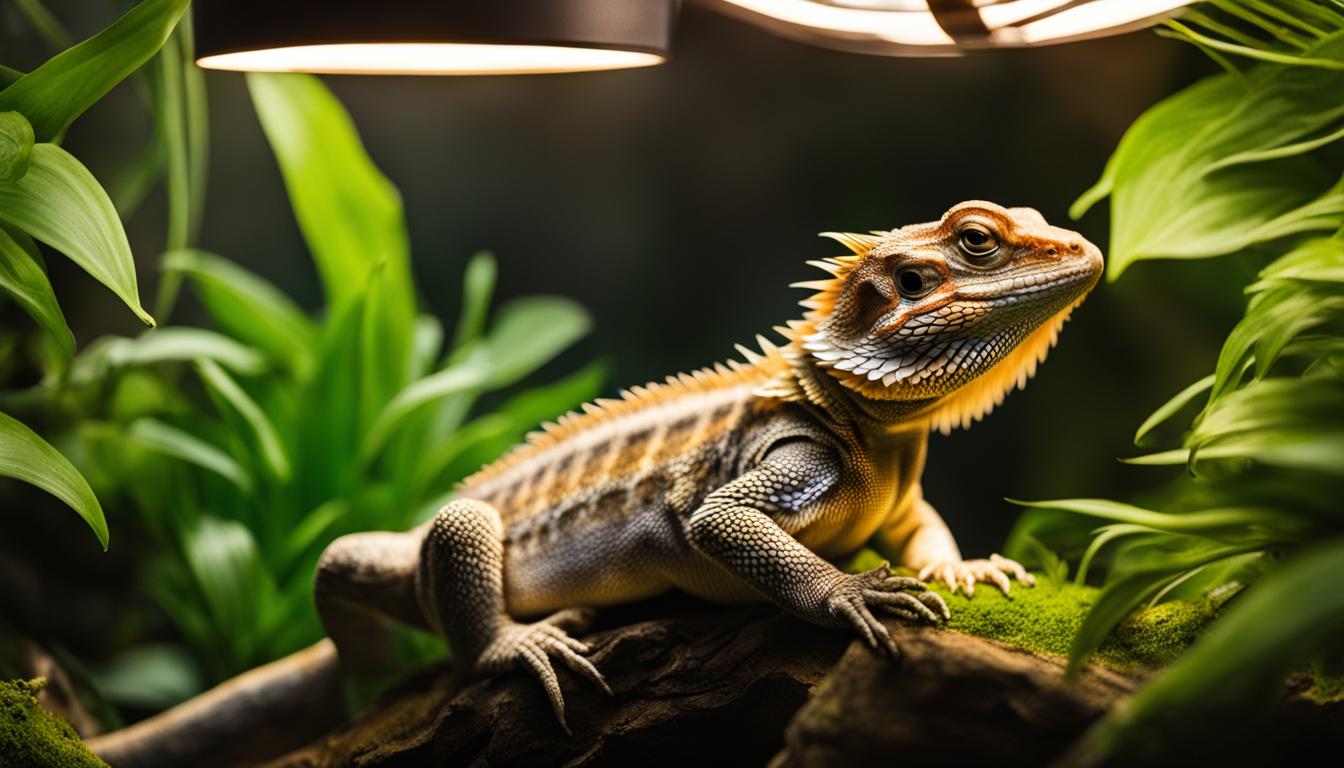Welcome to our guide on silk bearded dragon care! If you’re considering adding a unique and fascinating reptile to your family, a silk bearded dragon could be the perfect choice. These extraordinary creatures have captured the hearts of reptile enthusiasts with their stunning appearance and special care requirements. In this article, we will explore the essential aspects of caring for silk bearded dragons, including their habitat, diet, shedding, and more.
Key Takeaways:
- Silk bearded dragons require specialized care due to their lack of scales on their back and stomach.
- They are more sensitive to light, heat, and dehydration compared to regular bearded dragons.
- Proper enclosure setup with smooth surfaces and slightly higher humidity is crucial for their well-being.
- Hydration is essential for silk bearded dragons, especially during the shedding process.
- Regular monitoring of shedding, mating, and overall health is important for these unique pets.
Recommended Enclosure Setup for Silkback Bearded Dragons
| Enclosure Element | Description |
|---|---|
| Smooth Surfaces | Ensure all enclosure surfaces, including accessories, are smooth to prevent skin injuries. |
| Humidity | Maintain slightly higher humidity levels than regular bearded dragons, using a reliable hygrometer to monitor. |
| Lighting | Select lighting options with low levels of UVB rays to protect the silkback’s sensitive skin, and provide shaded areas for UVB breaks. |
By following these guidelines, you can create an optimal enclosure setup for your silkback bearded dragon, ensuring their comfort and well-being. Remember to regularly monitor and adjust the conditions based on your dragon’s specific needs, allowing them to thrive in their unique habitat.
The Importance of Hydration for Silkback Bearded Dragons
Silkback bearded dragons, with their lack of scales, require special attention when it comes to hydration. Dehydration can be a significant concern for these unique reptiles. Maintaining adequate hydration is crucial for their overall health and well-being, especially during the shedding process.
In order to ensure proper hydration for silkback bearded dragons, there are a few key practices that owners should follow.
Misting for Hydration
One effective way to provide hydration to silkbacks is through misting. Lightly misting their greens and insects before feeding can add a significant amount of moisture to their diet, helping to keep them hydrated. This method allows them to consume water through their food and helps prevent dehydration.
Feeder Insects and Nutritious Greens
It is important to supply feeder insects with plenty of hydration and nutritious greens before feeding them to your silkback bearded dragon. This ensures that the insects pass on essential moisture and nutrients to your pet, promoting hydration and overall health.
Bathing for Hydration and Shed Removal
Giving your silkback bearded dragon frequent baths is another way to help them stay hydrated and aid in the shedding process. Bathing provides an opportunity for them to absorb moisture through their skin. Additionally, it can assist in the removal of dead skin cells during shedding, promoting a healthy skin condition.
Remember to use caution when using any dry oils or lotions on your silkback bearded dragon’s skin, as these can cause burns when exposed to a basking light.
By prioritizing hydration and following these practices, you can help ensure the well-being of your silkback bearded dragon and keep them healthy and happy.
Continue reading to learn more about the specific care requirements for silkback bearded dragons in the following sections.
Conclusion
Silkback bearded dragons require specialized care to ensure their health and well-being. The proper enclosure setup is crucial, providing smooth surfaces and slightly higher humidity. Adequate lighting, with low levels of UVB rays, helps protect their sensitive skin. Hydration is of utmost importance for silkbacks, especially during their shedding process.
A balanced diet consisting of live insects, leafy greens, and supplements is essential to meet their nutritional needs. Regular monitoring of shedding, mating, and overall health is necessary for these unique reptiles. With the right care and attention, silkback bearded dragons can make fascinating and rewarding pets for reptile enthusiasts.
Remember, silkback bearded dragons are not like regular bearded dragons. They require specialized care due to their lack of scales. By providing them with the appropriate enclosure setup, proper lighting, hydration, and a balanced diet, you can ensure that your silkback bearded dragon thrives in their environment. Take the time to monitor their shedding process and overall health, and you will have a unique and captivating companion to enjoy for years to come.
FAQ
What makes silkback bearded dragons unique?
Silkback bearded dragons lack scales on their back and stomach, requiring specialized care. They are more sensitive to light, heat, and dehydration and may have issues with shedding and mating.
What care regime is needed for silkback bearded dragons?
Silkback bearded dragons require a different enclosure setup, diet, and shedding care. Smooth surfaces in their enclosure, slightly higher humidity, and careful monitoring of shedding are essential.
How should I set up the enclosure for a silkback bearded dragon?
The enclosure for a silkback bearded dragon should have smooth surfaces to protect their skin. It should also have slightly higher humidity and appropriate lighting, with shaded areas for the silkback to retreat from UVB lights.
Why is hydration important for silkback bearded dragons?
Silkback bearded dragons are prone to dehydration due to their lack of scales. Adequate hydration is crucial for their overall health and well-being. Misting greens and insects, providing properly hydrated feeder insects, and giving frequent baths can help with hydration and shedding.
What is the care summary for silkback bearded dragons?
Silkback bearded dragons require specialized care, including proper enclosure setup, smooth surfaces, slightly higher humidity, appropriate lighting, and adequate hydration. Regular monitoring of shedding, mating, and overall health is essential.


